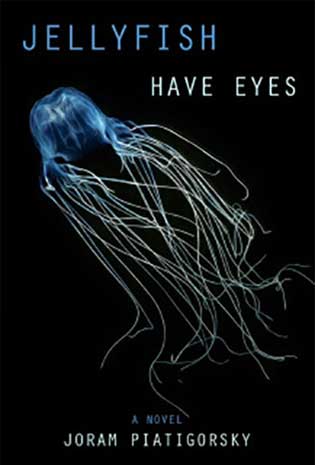Jellyfish have eyes, but what do they see? Are they able to think? If so, what do they think about? Questions like these preoccupy government research scientist Ricardo Sztein following the untimely death of his beloved wife, Lillian.
Haunted by Lillian’s deathbed admonition to “be careful” and his unspoken promise to find a cure for the disease that killed her, Ricardo is torn. Her death has freed a part of him, and her warning has brought to mind his father’s competing aphorism: “You are who you are and that’s all you can be.” Which advice should he follow?
Cast adrift, he heads for La Parguera bay to pursue the answers to his questions about jellyfish, using government research funds.
From a distance, the bay looks tranquil, like a postcard. But beneath the soft skin of the sea, the ugly reality of survival roils the water. The same is true in the cutthroat Vision Research Center in Washington, D.C., where survival strategies need to remain secret to maintain the tricky balance between life and death.
As an epidemic of blindness sweeps the country, government scientists are under increasing pressure from taxpayers and pundits to produce medically applicable results. In this politically charged environment, departure from stated research objectives can derail a career – and even lead to criminal charges.
Though he knows that fiscal responsibility and demonstrated medical relevance are the rules of the game, Ricardo cannot curb his curiosity about these invertebrates, or suppress his conviction that accidental discoveries can lead to unexpected breakthroughs.
Pulled back to La Parguera and facing recriminations for his alleged misuse of government funds, he begins to understand that fairness has nothing to do with his situation, and that bad luck is merely the mirror image of good luck.
Meanwhile, jellyfish float through his dreams – little predators in the guise of angels. Where are they going? They propel themselves through the water effortlessly, as if they are heading to a known destination, but drifting at the same time.

Published 2014 by
International Psychoanalytic Books
Reviews for Jellyfish Have Eyes
- Science and Culture: Using fiction to make the case for basic research
By Joel Shurkin, Science Writer, Proceedings of the National Academy of Sciences: What possesses a respected, retired scientist to take on the agonizing task of writing a novel and fighting to get it published? Author Joram Piatigorsky, an emeritus scientist from the National Institute of Health’s National Eye Institute, says quite simply that he had something important to say.
- Scientist-penned book supports “curiosity-driven” research
By Andrea Ford SCOPE, Published by Standford Medicine: The review highlights the protagonist's passion, which reflects Joram Piatigorsky's passion, for basic science research as a means to expanding our knowledge and sparking scientific breakthroughs.
- Review of Jellyfish Have Eyes in Kensington Library Newsletter
Jellyfish Have Eyes by Joram Piatigorsky. Fiction. Piatigorsky’s debut novel is a suspenseful thriller mixing the biological sciences – research into the surprisingly fascinating world of jellyfish eyes – and politics.
- NEI Scientist Emeritus’s Debut Novel Probes Jellyfish Eyes
By Kathryn DeMott, NIH Record: NEI scientist emeritus Dr. Joram Piatigorsky remembers the moment he became captivated by jellyfish eyes. He was reading a book about invertebrate vision and there it was—an image of a very familiar-looking eye looking back at him from the most ancient multi-organ animal. The eyes of jellyfish became a focus of his more than four-decade long career at NIH.
- Narrative NIH scientist enters literary world
By Ellyn Wexler, Special To The Gazette: Joram Piatigorsky is somewhat of an anomaly. The Bethesda resident identifies himself as half scientist, half artist.
Praise for Jellyfish Have Eyes
- “Gives a chilling warning that is sure to stimulate debate”
“The time is the near future when an economically stressed government threatens academic freedom of basic scientists. In ‘Jellyfish Have Eyes,’ an award-winning scientist pays a heavy price for his breakthrough discoveries that jellyfish interact and visualize evolution. Piatigorsky’s imaginative account that Dr. Ricardo Sztein’s path from discovery to condemnation gives a chilling warning that is sure to stimulate debate on the role of government in dictating the direction of scientific research.”
–Joseph Horwitz, Ph.D., Distinguished Professor, UCLA School of Medicine
- “Rich dystopian novel”
"In this rich dystopian novel Ricardo Sztein risks all to follow his intellectual curiosity in defiance of the extreme utilitarianism of his society. The spiritual cousin of Dickens’ “Hard Times”, with a nod to Big Brother, “Jellyfish” projects our current pragmatism into a frightening but possible future. A wonderful book for those who love creativity, science and the great gifts of serendipity."
–Barbara Esstman, author, The Other Anna and Night Ride Home
- “Ricardo Sztein is an unforgettable character”
"This novel draws you into its web of complex circumstances by degrees, unfolding like a kind of scientific experiment; it unravels the entire research and scientific community—challenges the tenets of evolution, knowledge, being and believing. The unity of knowledge, knowledge itself is turned upside down. Ricardo Sztein is an unforgettable character, and this story is definitely a winner."
–Robert Bausch, author, A Hole in the Earth, and Far as the Eye Can See
- “Interesting on many levels!”
A wonderful book! The book's main character is a scientist, an expert on diseases affecting eyes, who becomes fascinated by jellyfish. (They do have eyes…very complex eyes!) The book is interesting on many levels: the value of basic scientific research; the pressure to link research to medical advances in order to obtain funding, and the politics of funding scientific research. I loved the descriptions linking scientific discovery and creativity.
The author, Joran Piatigorsky, is an internationally respected, award-winning scientist whose specialty is the molecular biology of the eye. This is his first novel. I look forward to reading more of his work.
–Deborah Hartman
- “Original and provocative”
"In this original and provocative combination of science and fiction, Joram Piatigorsky brings to life evidence of Dr. Johnson’s observation that Truth can be made more accessible when draped in the robes of fiction."
–Warren Poland, MD, Psychoanalyst, author, Melting the Darkness
- “Brilliant first novel”
"In the author's brilliant first novel, we travel into a tropical lagoon with Dr. Ricardo Sztein, a maverick scientist who is mesmerized by jellyfish. This fast-paced adventure is partly about Dr. Sztein's unusual and fascinating discoveries as he studies his beloved jellyfish. It also raises compelling questions about whether originality and creativity in research are valued or demonized by our government and academia."
– Stanton Samenow, Ph.D., Clinical Psychologist, author, Inside the Criminal Mind
- “Fascinating and delightful”
“This highly original story of jellyfish is fascinating and delightful. We travel to a warm mangrove swamp near Puerto Rico with Dr. Ricardo Sztein, who discovers that these fish store evolutionary memories. Troubles abound when his studies are revealed, but the adventures of this quirky, endearing scientist are memorable.”
– Ann L. McLaughlin, author, Amy & George
- Kirkus Reviews: An intelligent, wistful rumination …

Piatigorsky (The Speed of Dark, 2018, etc.) offers a speculative novel about a researcher undertaking a pure-knowledge scientific study in an era of hostility to free inquiry.
Financial collapse in the near future has left the United States with a huge unemployment rate, new diseases appearing and old scourges returning, more conservatives in Congress, and a rabble-rousing Washington, D.C., reporter slamming taxpayer spending on any research that doesn’t promise immediate, practical payoff. In the 2040s, researcher Ricardo Sztein is an aged, respected fixture at the Vision Science Center who is shaken after his wife’s cancer death. He embraces his other great love—science experimentation just for the sake of knowledge, not a dictated agenda or financial return. His curiosity about how jellyfish see with multiple eyes (“rhopalia”) of unexpected complexity sends him to the swamps of Puerto Rico, supported by like-minded colleagues and a loan of NASA computer tech. Clues uncovered in his field lab hint at new revelations about animal perception and evolutionary biology. But when his rambles become publicly known, grandstanding politicians and media condemn him, cuing a public tribunal that’s reminiscent of that in the film Inherit the Wind. Piatigorsky is a scientist and essayist, so he knows of what he speaks regarding the cloistered realm of modern inquiry and exploration, which includes people jockeying for grants with ambition masked by professional etiquette. He also expresses scientists’ angst that average citizens appreciate nothing about basic research and could pull the plug on it at any moment. The future that the author evokes in this high-minded, speculative drama is thinly sketched, but what readers do glean about it is unpleasant, indeed. The jellyfish material, meanwhile, seems fanciful, but it’s firmly based in fact; the author includes photographic illustrations here that shore up the science. Still, it’s an intelligent, wistful rumination on the value of scientific pursuit, the joy of discovery, and the loneliness of a maverick thinker. A sensitive drama about an aged scientist in an anti-intellectual era.
–Kirkus Reviews
